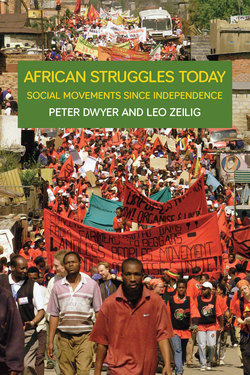African Struggles Today

Реклама. ООО «ЛитРес», ИНН: 7719571260.
Оглавление
Peter Dwyer. African Struggles Today
Contents
Отрывок из книги
A message from Haymarket Books
We hope you're as excited as we are that you are now the proud owner of a Haymarket ebook! Haymarket Books is a nonprofit, publisher of radical books aimed at activists and scholars who want to change the world.
.....
The book concludes in chapter 8 with a comparative analysis of the role of social movements in Africa, both historically and in the contemporary period. It identifies important lessons drawn from the findings of the study and suggests ways in which social movement approaches may strengthen the activities of civil society and non-governmental organizations on the continent as well as internationally. The revolutionary process that is still developing in North Africa and igniting movements in parts of the Middle East is testament to the continued vibrancy of social movements across the continent. Indeed, one of the primary reasons for writing this book was to insist that we cast our gaze on the continuing organic development of these movements that demand our attention, solidarity, and celebration. This book seeks to develop and deepen the search for political alternatives for those who want to see a world not dominated by neoliberalism, austerity, and underdevelopment.
By the time Cabral issued his warning about the nature of the African state, the assumptions underlying state-led developmental nationalism were being undermined by the onset of the global recession of the mid-1970s. The recession, which affected the world unevenly, was most severe in the recently independent countries of the Third World. The sudden rise in the price of oil hit most African economies hard, as did the collapse of international commodity prices. Most of sub-Saharan Africa was, as a legacy of colonialism, economically dependent on the export of raw materials, cash crops, and the production of single minerals. The price of such goods was determined by Western institutions such as the London Metal Exchange, and the collapse in the value of commodities devastated the earning power of many African states. For example, the collapse in the price of copper halved the Gross Domestic Product (GDP) of Zambia in the space of a few years. This decisively exposed national developmentalism as largely dependent on international factors beyond the control of supposedly sovereign African states. Many governments dealt with this problem by short-term borrowing, creating the long-term debt burden that, notwithstanding the real achievements of the Jubilee movement, is still with us today.
.....